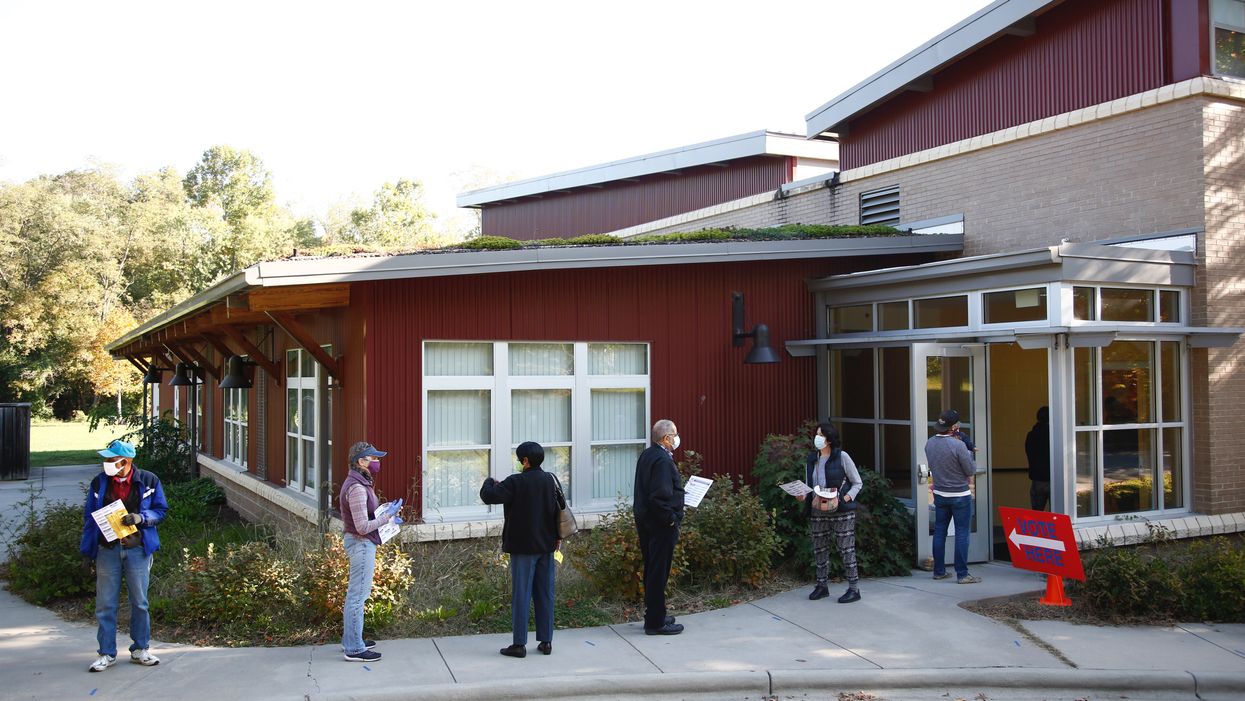The rules for voting by mail in North Carolina just got a bit clearer, and a bit easier. But plenty remains up in the air, 13 days before the voting stops, in one of the seven states on course to decide the presidency.
The state will accept ballots arriving as many as nine days late so long as they're postmarked by Election Day, a federal appeals court ruled 12-3 on Tuesday, a lopsided victory for Democrats and voting rights advocates in which all three judges President Trump named to the he 4th Circuit Court of Appeals ruled against his interests.
But the three dissenting judges urged the Republicans to take their arguments to the Supreme Court, so the dispute may not be over. And federal and state courts are continuing to consider other lawsuits — about contested signatures on absentee ballots and whether poll watchers may observe vote-by-mail tabulation — that could also delay definitive election results for weeks beyond Election Day.
Trump carried the state's 15 electoral votes by 3 percentage points last time, a bigger margin than a handful of his other wins, but polling shows him in a statistical dead heat with former Vice President Joe Biden. GOP Sen. Thom Tillis has become an underdog in his bid for a second term, however.
Sign up for The Fulcrum newsletter
After a week of early voting, 1.5 million North Carolinians have cast ballots in person and almost 700,000 have returned absentee envelopes, both records in the state for this stage in the election. But almost 1 percent of the mail ballots have been rejected or put in limbo, mainly because of questions about the signatures.
The 4th Circuit declined to stop the state from accepting delayed-in-the-mail ballots up to Nov. 12. The state Board of Elections agreed to do so last month to settle a lawsuit by voting rights advocates. At that point the GOP leaders in the General Assembly sued, arguing the decision belonged to the Legislature.
They judges bought an argument similar to the one the Supreme Court accepted this week when it allowed a deadline extension in an even bigger purple state, Pennsylvania: The change was a fair response to the surge in voting by mail brought on by the coronavirus pandemic and the recent problems with the Postal Service.
"Everyone must submit their ballot by the same date. The extension merely allows more lawfully cast ballots to be counted, in the event there are any delays precipitated by an avalanche of mail-in ballots," Judge James Wynn wrote in the opinion. The majority also noted that altering things now would violate a principle the Supreme Court has cited several times this year, which is that federal judges should not make last-minute changes in state election procedures.
The dissenters, all nominees of GOP presidents, said the extension "would cause yet further intolerable chaos" and urged the Republicans to appeal to the high court "immediately. Not tomorrow. Not the next day. Now."
By the time the court gets such an appeal, Judge Amy Coney Barrett seems certain to have joined the bench. She is on course to be confirmed Monday, positioning her to prevent a potential repeat of the 4-4 deadlock in the Pennsylvania case.
Meanwhile, several thousand ballots already turned in have been in a state of suspended animation because of several lawsuits about "curing," which is when voters are told about problems with their submissions and given a shot at fixing things.
The system lurched ahead a bit this week, when the Board of Elections and Attorney General Josh Stein instructed election officials to follow a complicated process: People will be permitted to correct the ballots they've turned in if they did not sign their envelopes, did so in the wrong way or didn't submit the right information about the witness they were required to find.
But things will be tougher for people who forgot to get a witness or whose envelopes were not sealed when they arrived at election offices. They will be asked if they would like to be sent a fresh ballot for a total do-over.
The next challenge for this system is a lawsuit by the state GOP demanding permission to deploy operatives to county boards of elections so they can watch the processing of absentee ballots — and challenge envelopes they think are fishy but the county inspectors are fine with. A ruling in favor of the Republicans could tie up the tabulation statewide even beyond the new Nov. 12 deadline for ballot arrivals.

